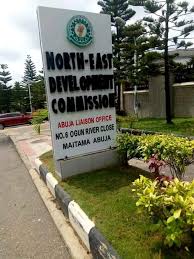Evaluating NEDC's Efforts In Flood Response By Nkechi Odoma
The impact of flooding in communities in Yobe and Adamawa states in North East Nigeria cannot be over-emphasized. People were displaced, and farmland was submerged in what could be regarded as one of the worst floodings in North East Nigeria.
This is a trying time for communities that have experienced the effect of the Boko Haram insurgency for several years. Now that life is beginning to return to normal, the floods came in torrents, displacing many and with the potential to cause a humanitarian crisis, but for the swift intervention of the North East Development Commission (NEDC).
It is a statement of fact that since the establishment of the NEDC, among other things, to receive and manage funds from allocation of the Federal Account and international donors for the settlement, rehabilitation and reconstruction of roads, houses and business premises of victims of insurgency as well as tackling the menace of poverty, illiteracy level, ecological problems and any other related environmental or developmental challenges in the North-East states. The NEDC has so far lived up to expectations in fulfilling this mandate.
The various intervention of the NEDC in North East Nigeria has been noteworthy. The flooding in Yobe state and other parts of North East Nigeria provides us with that where the NEDC has been relentless in ensuring that life returns to normal in the region. I marvelled at the response rate of the NEDC in this regard.
It is on record that disaster victims were identified with swift and relief materials distributed to mitigate the effect of the flooding in affected communities. This is a plus for an interventionist agency working round the clock to rebuild the region to bring about a return to normalcy after the devastating effect of the Boko Haram insurgency.
Those of us in the know of the efforts of the NEDC would attest to the fact that its various activities have been notable in the North East region. This is where I rate the agency's leadership highly concerning understanding what matters most in affected communities and the urgency with which laudable policies and programmes are implemented.
Another strong point of the NEDC is its seamless collaborations with the various state governments in North East. This is strategic and little wonder the many gains recorded so far. Also, the emphasis on timly and effective interventions, especially in crises, indicates that the agency is alive to its responsibilities.
If the tempo is sustained, humanitarian crisis will be averted promptly. I commend the leadership of the NEDC for this laudable drive, as in the case of Yobe state and other states in North East. And the commendation has not been in short supply from stakeholders, members of affected communities, and development partners.
For example, The Good Governance Watch in Africa recently applauded the North East Development Commission over its reconstruction and rehabilitation efforts in the sub-region. It also commended the 10-year North East Stabilisation and Development Master Plan (NESDMP), adding that it will facilitate transformative growth and further lift citizens in the sub-region out of poverty.
Similarly, The North East Peace Foundation commended the North East Development Commission for its laudable intervention initiatives introduced in the region. According to the group, the Commission’s impact has been visible in the rehabilitation and reconstruction of roads, houses and business premises of victims of insurgency, as well as tackling the menace of poverty, illiteracy, ecological problems and any other related environmental or development challenges. It emphasized that the NEDC has shown the capacity to undertake humanitarian activities with its record of excellent service delivery.
The testimonies for the efforts of the NEDC have been that of an outpouring of appreciation for an agency that, in record time, has impacted positively in North East Nigeria. This again brings to the fore the leadership question and how sound leadership could guarantee sustainable growth and development in the country.
The NEDC example is worthy for other interventionist agencies in the country to emulate. It has entrenched transparency and accountability in its operations by giving a good account of its utilization of funds for developmental projects, which indicates an agency that means business.
The Mohammed Goni Alkali-led management team at the NEDC deserves commendation for hitting the ground running through the development and implementation of policies and programmes that address the socio-economic challenges in North East Nigeria occasioned by the Boko Haram insurgency.
It must be noted that, indeed, other communities outside Yobe state were affected by flooding and the NEDC response in this regard ensured that those affected were adequately taken care of through the prompt provision of search and rescue operations and the delivery of relief materials, and the provision of shelter to those displaced.
This is NEDC at work in North East Nigeria, and the cheering news is that it has continually elicited support from host communities who are ever appreciative of their efforts towards addressing the myriad of challenges in the region.
There is no doubt that the NEDC is one of the best interventionist agencies in the country. It has redefined the concept of addressing challenges occasioned by conflict and disasters. We must admit this was brought about by the provision of sound leadership by Mohammed Goni Alkali and his management team.
The NEDC intervention in the flooding in parts of North East is the tip of the iceberg compared to other areas the agency has been involved in North East Nigeria. I salute this rare feat and wish to encourage the NEDC not to rest on its oars. I also encourage other government agencies to emulate the NEDC example in service delivery.
Odoma is a public affairs analyst based in Abuja.




Comments
Post a Comment